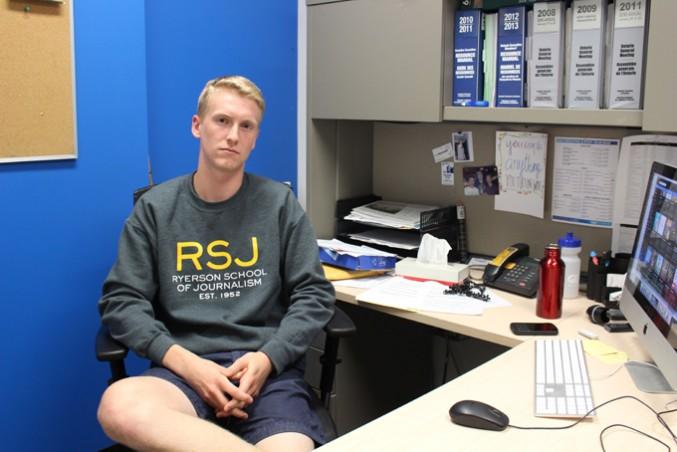By Keith Capstick
After a semester of debate surrounding access to education at Ryerson, vice-president education Cormac McGee and the Ryerson Students’ Union (RSU) met with a representative from the Ontario Ministry of Training, Colleges and Universities on Jan. 25.
McGee brought with him a plan to work with the province to create a base pool of finances to compensate students for unpaid work they participate in to finish their degree.
“Money would come every year to offset the cost of unpaid internships that are for credit because a lot of those costs get downloaded onto students,” McGee said. “This money needs to come from the province because if you try to get [an employer] to pay, they’re just going to slash the placements.”
This process’ beginning is the culmination of the RSU’s battle to find a way to fight for access to education on campus but notably is not centered around the goal previous RSU governments have prioritized — freezing tuition fees. McGee said this goal isn’t realistic.
“I really think that the province didn’t really take us seriously before we showed up … We wanted to go in with something that was really tangible,” McGee said. “When you have a province that’s trying to dig out of their massive deficit … right now I don’t think freezing tuition is really on the table for them at all.”
Vajdaan Tanveer — a vocal member of Reignite Ryerson — the group of students who have been critical of the RSU’s inability to take an official stance on tuition fees, is frustrated by this outcome.
“It shows the lack of genuine effort that they put in initially be- cause when they first started [to discuss access to education] their initial comment was that there was work to be done with the province in terms of tuition fees,” Tanveer said. “Now I don’t think they were being genuine in that, I think they just wanted to say something.”
Reignite doesn’t see this specific fight for unpaid internships as a campus-wide campaign, and despite applauding the cause, they say tuition fees are where the fight lies.
“He definitely isn’t representing all of the school right now in the work that he’s doing in terms of access to education,” said Tanveer.
Back at Ryerson the next day, McGee took to the Ryerson Board of Governors with a presentation of the key issues students at Ryerson are facing. These issues range from accessibility to mental health support and shortening wait times for counselling. The presentation is the first step of the RSU’s involvement with the macro budgeting committee to help distribute funds to the places students want them.
McGee said due to the school’s rocky relationship with previous RSU governments, they were apprehensive about starting this process.
“Obviously relationships between administration and RSU haven’t always been great and there’s obviously some trust issues but I think they’re ready to listen to us,” McGee said.
According to McGee this is the first time students have been considered in the macro budgeting process outside budgeting town halls the school held in previous years. He said process won’t allow administration to “go up into Jorgensen Hall and not be heard from again.”
“What’s different this year is that we’re the first people they’re hearing from,” McGee said. “I’m working to set up a date where we’re going to host a public event where [the macro group] is going to report back on how they’re committing to each one of these [requests].”
Reignite is skeptical the same dialogue-only mentality won’t continue with this latest RSU attempt.
“I’m glad they’re bringing students into the fold but it’s a piece of a larger puzzle. My question is, ‘What’s going to be the result of this?’” said Mitchell Demars, a fourth-year politics and governance student, who is a member of Reignite. “Just more dialogue or is there going to be a serious funding priority change?”










Leave a Reply